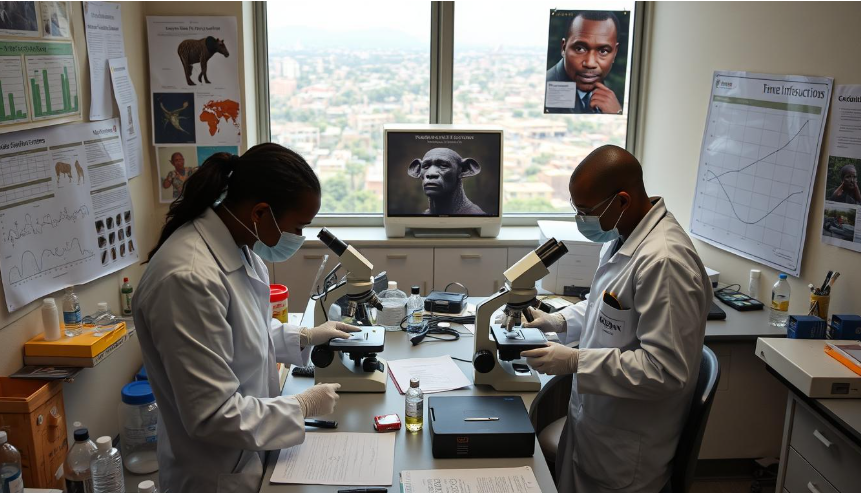Did you know Computer Security & Forensics is a hot course in Kenya? It shows how digital security matters more with more cyber crimes. This means forensic science jobs are in demand.
As Kenya gets more tech-savvy, forensic science is a great career. You can help solve crimes and understand digital clues.
Forensic science mixes computer security, math, logic, and science to solve crimes. Schools like Strathmore University and Meru University offer top programs. They prepare you for a career in forensic science.
Table of Contents
Current State of Forensic Science in Kenya
Forensic science in Kenya is growing fast. This is thanks to more money going into labs from the government and private companies. This growth means more jobs for those interested in forensic science.
Overview of Forensic Laboratories
Forensic labs in Kenya are key for law enforcement and justice. They have the latest tech and skilled people. These labs analyze evidence and help solve crimes.
The need for these services is increasing. This is making labs expand all over the country.
Key Government Institutions
The Kenyan government sees the value of forensic science. It has invested a lot to improve it. The DCI and Government Chemist Department have top-notch labs.
These places work with international groups. They keep up with new forensic tech.
Private Sector Involvement
The private sector in Kenya is getting more involved too. Private labs and consultancies are popping up. They serve industries like healthcare and corporate investigations.
This growth means more jobs for forensic experts. It’s a good time to join this field.
| Forensic Laboratories in Kenya | Specialties | Key Institutions |
|---|---|---|
| Government Forensic Laboratories | Crime scene investigation Ballistics and firearms analysis Forensic toxicology DNA analysis Document examination | Directorate of Criminal Investigations (DCI) Government Chemist Department |
| Private Forensic Laboratories | Environmental forensics Food and drug analysis Corporate investigations Digital forensics | Kenya Forensic Laboratories Limited Analytical Services Limited |
The need for forensic services in Kenya is rising. So are the forensic laboratories in Kenya. This is great news for those wanting to work in forensic science. They will find many career paths and help make justice and safety better.
Understanding Forensic Science Education Requirements
Starting a career in forensic science in Kenya often means getting a bachelor’s degree. You might study chemistry, biology, or computer science. Some schools in Kenya have special forensic science programs. These cover crime scene work, evidence analysis, and digital forensics.
It’s important to have strong analytical and problem-solving skills. These are key for success in this field.
The entry requirements for forensic science courses in Kenya differ. Certificate programs need a KCSE grade of D. Diploma programs require a C or C- grade. Bachelor’s degree programs ask for a KCSE mean grade of C+ or its equivalent.
The cost of these programs varies. It can be from about 30,000 KES to 200,000 KES per year. This depends on the study level and the school.
Some schools in Kenya now offer online criminology and forensic science courses. This is great for those who can’t attend classes in person. But, make sure the online programs are accredited and meet your career goals.
Forensic science graduates in Kenya are in high demand. They can work in law enforcement, corrections, security, social work, research, and policy analysis. Starting salaries for criminologists are around £23,500. Top salaries can reach £36,000.

Whether you get a specialized forensic science degree or a related field, focus on a strong foundation. Learn scientific principles, critical thinking, and evidence-based investigation. With the right education, you can open doors to many opportunities in forensic science in Kenya.
Is Forensic Science Marketable in Kenya
Forensic science is becoming more popular in Kenya. The focus on criminal justice and cybersecurity is growing. This means more jobs for forensic scientists in law enforcement, private firms, and research.
Job Market Analysis
The need for forensic science experts in Kenya is increasing. The country is investing in its criminal justice and cybersecurity. This will lead to more jobs for skilled forensic scientists in government, private security, and labs.
Salary Expectations
Forensic science jobs in Kenya offer good salaries. Salaries depend on education, experience, and the job. Forensic scientists can earn between Kenyan Shillings 50,000 to 150,000 monthly. Those with special skills or advanced degrees can earn more.
Growth Potential
The future of is forensic science marketable in Kenya looks bright. Kenya’s focus on safety, security, and technology will boost demand for forensic services. Those with strong skills in crime scene work, lab analysis, and digital forensics will have great opportunities.

Top Universities Offering Forensic Science Programs
If you’re interested in forensic science, you’ll find many Kenyan universities offering programs. These programs mix theory with practical skills. They prepare students for the job market and give them the skills to succeed in forensic science.
Strathmore University leads with its Diploma in Cyber Security and Forensics. It trains students to fight digital threats. Meru University also offers a Diploma in Criminology and Security Studies. It teaches research skills and how to reform the criminology and security sectors.
Mount Kenya University has a wide range of programs approved by the Commission for University Education in Kenya. They offer Ph.D., Masters, Postgraduate Diplomas, Bachelors, Diploma, and Certificate courses. Relevant programs include Diploma in Accounting and Finance, Diploma in Hospitality Management, and Diploma in Human Resources Management.
These programs in Kenya focus on both theory and practical skills. They prepare graduates for careers in forensic science. This includes roles in crime scene investigation, laboratory analysis, and digital forensics.

| University | Forensic Science Programs |
|---|---|
| Strathmore University | Diploma in Cyber Security and Forensics |
| Meru University | Diploma in Criminology and Security Studies |
| Mount Kenya University | Diploma in Accounting and Finance Diploma in Hospitality Management Diploma in Human Resources Management |
Career Paths in Forensic Science
Forensic science in Kenya has many career paths for those who love criminal investigation and analysis. You can work with physical evidence, do lab tests, or explore digital forensics. There are lots of ways to help solve crimes.
Crime Scene Investigation
Crime scene investigators are key in solving crimes. They carefully collect and keep evidence from crime scenes. This evidence, like fingerprints and blood samples, helps solve cases.
Laboratory Analysis
Forensic lab analysts test evidence collected by crime scene investigators. They do tests like DNA analysis and toxicology. They use advanced tools to find clues that help solve crimes.
Digital Forensics
Digital forensics is important in today’s world. Experts analyze digital devices to find evidence of crimes. They use special software to find deleted files and track online activities.
Forensic science also includes roles like forensic toxicology and forensic psychology. Each area needs special skills. A career in forensic science helps keep society safe and fights for justice.
Skills Required for Forensic Science Professionals
Aspiring forensic science professionals in Kenya need to have a special set of skills. Forensic science skills Kenya and forensic evidence analysis in Kenya mix technical know-how with soft skills.
Analytical thinking is key. Forensic scientists must examine evidence closely, interpret data, and make logical conclusions. They also need to pay close attention to detail. Even a small piece of evidence can be crucial in solving a case.
- Strong communication skills are vital. Forensic professionals work with law enforcement, legal teams, and other experts. They must be able to clearly share their findings and testify in court.
- Knowing how to use equipment and software is another important skill. Forensic scientists need to be good at operating advanced tools and software.
- Understanding Kenyan law and criminal justice procedures is also crucial. This ensures evidence is collected, analyzed, and presented correctly.
By developing these skills, aspiring forensic science professionals in Kenya can succeed in this challenging yet rewarding field.
Technology and Innovation in Kenyan Forensics
Kenya is using technology to improve its forensic work. The country is changing how it does forensic science. It’s using new DNA analysis, digital forensic tools, and crime scene equipment.
Modern Equipment and Techniques
Kenyan labs now have top-notch DNA tools. These tools help find suspects more accurately and quickly. They make it easier for scientists to work on criminal cases.
Digital Forensic Tools
Cybercrime is growing in Kenya. So, it needs better digital forensic tools. Law enforcement uses new tools to find digital evidence from phones, computers, and online. These tools are key in solving crimes.
Future Technological Trends
Kenya’s forensic science is getting even better. Experts think AI and blockchain will be used soon. AI will help understand big data better. Blockchain will keep digital evidence safe and reliable.
Forensic experts in Kenya must keep up with new tech. By doing so, they make their work better. This helps keep society safe and fair.
Challenges and Opportunities in the Field
Kenya’s forensic science industry is growing, but it faces many challenges. One big issue is the lack of resources and infrastructure. This scarcity can actually spark creativity and innovation.
Another challenge is keeping up with new technologies and methods. Forensic science is always changing. To stay ahead, professionals need to keep learning and improving their skills. This not only makes the workforce stronger but also opens up new career paths.
Forensic science is becoming more important in Kenya’s justice system. This means more jobs for experts in forensic science. Graduates can find work in many areas, helping to make the legal system stronger.
Read Also:
FAQ
What is the current state of forensic science in Kenya?
Forensic science in Kenya is growing fast. It combines computer security, math, logic, and science. The sector is expanding, with more labs opening.
Kenya needs more experts in quality control and water treatment. This is a chance for new careers.
What are the education requirements for forensic science in Kenya?
To start in forensic science, you need a bachelor’s degree. This can be in chemistry, biology, or computer science. Some schools offer special forensic science programs.
These programs teach about crime scenes, evidence, and digital forensics.
Is forensic science a marketable career in Kenya?
Yes, forensic science is getting more popular in Kenya. There are more jobs in law enforcement and private firms. Salaries are good, and the field is growing.
What are the top universities offering forensic science programs in Kenya?
Top schools for forensic science in Kenya include Strathmore University and Meru University. They also offer computer science and technology courses with forensic parts.
What are the various career paths in forensic science in Kenya?
Forensic science has many career paths in Kenya. You can be a crime scene investigator, lab analyst, or digital forensics expert. Other roles include forensic toxicologist, psychologist, and accountant.
What skills are required for successful forensic science professionals in Kenya?
Forensic scientists need technical and soft skills. They must be analytical, detail-oriented, and good at communication. Knowing Kenyan law is also key.
What are the latest trends and innovations in forensic science in Kenya?
Kenya is using new forensic technologies. This includes DNA analysis, digital forensics, and crime scene tools. Future trends might include AI and blockchain.
What are the challenges and opportunities in the field of forensic science in Kenya?
Kenya faces challenges like limited resources and the need for training. But, these challenges also offer chances for innovation and specialization. The field’s growing importance means more job opportunities.













Leave a Reply